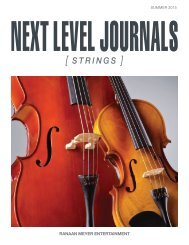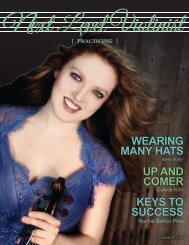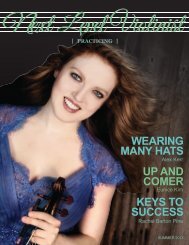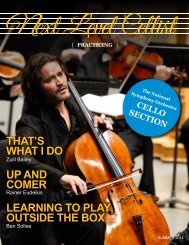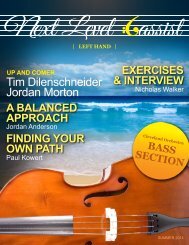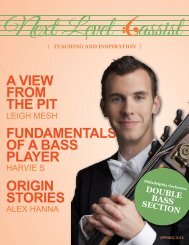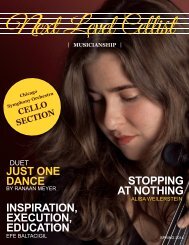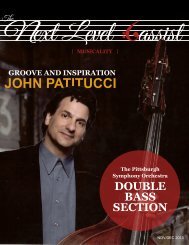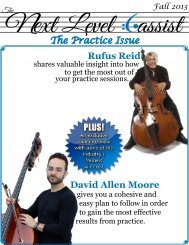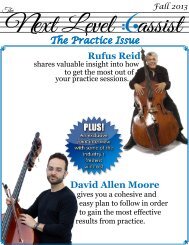The Next Level Bassist - Practicing
Articles by David Allen Moore and Rufus Reid, interviews with recent audition winners, free sheet music by Ranaan Meyer, and more!
Articles by David Allen Moore and Rufus Reid, interviews with recent audition winners, free sheet music by Ranaan Meyer, and more!
Create successful ePaper yourself
Turn your PDF publications into a flip-book with our unique Google optimized e-Paper software.
controlled sense of dynamics and phrases, and, most importantly,<br />
savvy of the style.<br />
Is it really necessary to practice Jazz?<br />
As a creative jazz bassist, consider yourself an illusionist,<br />
someone who makes one feel and hear what’s not really<br />
there. <strong>The</strong> listener becomes so engaged by your performance,<br />
they feel a great pulse, but there is no drummer.<br />
<strong>The</strong>y hear wonderful clear harmony, but there is no piano,<br />
or any chordal instrument. <strong>The</strong> listener is totally satisfied<br />
listening to your presentation without the feeling of missing<br />
something or someone. When you are successful achieving<br />
this, you will be remembered and sought after for the clarity<br />
and control you bring to any ensemble. <strong>The</strong> mindset I<br />
wish you to develop is:<br />
You are the only rhythmic and harmonic substance<br />
there is! You do not need a piano or drummer! We may<br />
want them to play with us, but you don’t need them for<br />
you to play well. If they are doing their job well, they do<br />
not need you either. We bassists have the unique ability to<br />
immediately sabotage every ensemble we play with if we<br />
lose our focus. Yes! Absolutely! In addition to the attributes<br />
of a great musician, the jazz musician must be capable of<br />
thinking quickly by functionally creating new melodic material<br />
to satisfy the sounds of any given structure or form<br />
of a song. <strong>The</strong>re is a definite vocabulary of sounds that<br />
make up structures of compositions. I call these structures<br />
“Musical Playgrounds.” Generally speaking, a playground<br />
is a place where all sorts of sports are played. Each sport<br />
has its own playground with very specific areas, boundaries,<br />
and rules. If we consistently don’t observe those specific<br />
rules, fouling all the time, stepping on the lines, etc., we are<br />
asked not to play. Music making is no different. Learn the<br />
rules to be in control of what comes out of your instrument.<br />
It is not a mystery to become an improvising jazz musician.<br />
You just need to know the rules so you can navigate within<br />
the playground successfully. It is NOT rocket science!<br />
What are the ingredients that make up that chord sound<br />
that you hear? It is the “root”, “third”, “fifth”, and “seventh”<br />
of a scale, that makes up a chord. <strong>The</strong>re are only<br />
five (5) basic chord sounds: Major, Minor, Diminished, Augmented,<br />
and Dominant! All five have a very distinct sound<br />
unto themselves. Learn and internalize each sound along<br />
with their respective scales. <strong>The</strong> rest of the sounds are slight<br />
alterations of these five, and THAT’S IT! No matter what<br />
key they are in, they all sound the same. <strong>The</strong> main difference<br />
from just reading music, is, the improvising jazz player<br />
decides how he/she will play by imagining what are the<br />
possibilities. YOU make all of the decisions of what notes<br />
to play, how many notes, what rhythms to use, what dynamics<br />
to use, etc. Thinking of how you want to sound before<br />
you play is crucial to your success! You must practice<br />
how to think, as well. Learn how to construct satisfying<br />
bass lines. Figure them out at the piano. Sing them in your<br />
head. Learn to play them on your bass by listening to how<br />
they sound. <strong>The</strong>se are the very same sounds that Bach,<br />
Mozart, Ravel, Brahms, Duke Ellington, <strong>The</strong>lonious Monk,<br />
etc. used. <strong>The</strong> sounds that make up these structures are<br />
called Chord Progressions. <strong>The</strong> style and how these sounds<br />
are presented is what distinguish the different genres from<br />
one another. <strong>The</strong>re are many excellent books available<br />
to learn how to become more fluent on the various techniques<br />
to play a successful improvised solo in the jazz style.<br />
I’m a bassist.<br />
Why should I be friendly with the piano?<br />
I am NOT asking you to become a pianist, just learn the<br />
basics of where the notes are related to where they sound<br />
on your bass. I was not told how important the piano is<br />
when I began to play music, particularly when I began to<br />
play the bass. I had a good ear and learned quickly, but<br />
that eventually was not enough to really get inside the<br />
music that I loved so much. I had to learn how to identify<br />
the sounds I heard from the symbols I saw. Whatever kind<br />
of music you wish to play, you will be a better musician if<br />
you become very friendly with the piano. Guaranteed! <strong>The</strong><br />
piano is the “orchestra” of sounds. You can “see” what the<br />
chord looks like, as well as hear it. Learning the keyboard<br />
and studying harmony will answer all of the questions of<br />
what makes up a chord sound and its harmonic motion.<br />
This is where you can practice your melodies or the phrases<br />
of the music you are working on by very clearly singing<br />
along in tune. Learn the sounds of the basic chords and<br />
their related scales. This functional knowledge will carry<br />
over onto your instrument because you are hearing these<br />
sounds clearly in your head. Again, no one cares if you<br />
practice, or who your teacher was, or if you take lessons<br />
or not, or how long it took you to get it. What matters is<br />
once you get on the bandstand or stage, all they want is to<br />
hear the music clearly and swinging! When these elements<br />
of good practice are present, they will hear consistent, confident,<br />
enormous clarity, and passion soaring out of your<br />
bass. What more can one ask?<br />
What to practice?<br />
LISTEN to the individual or individuals who inspire you on<br />
a daily basis. Listen to their choice of notes in the chord<br />
progression. Listen how they hook up with the drummer.<br />
Practice on the CONCEPT of the kind of music you are<br />
attempting to play. CONCENTRATE on all of the nuances<br />
you hear in their playing, i.e. their “time feeling,” their<br />
“choice of notes” in a walking bass line, the “pizzicato<br />
sound” being produced in the right hand. Try to incorporate<br />
and emulate by aurally transcribing everything you<br />
hear. <strong>The</strong> best way to transcribe is to sing and/or whis-<br />
(Continued on Page 12)




